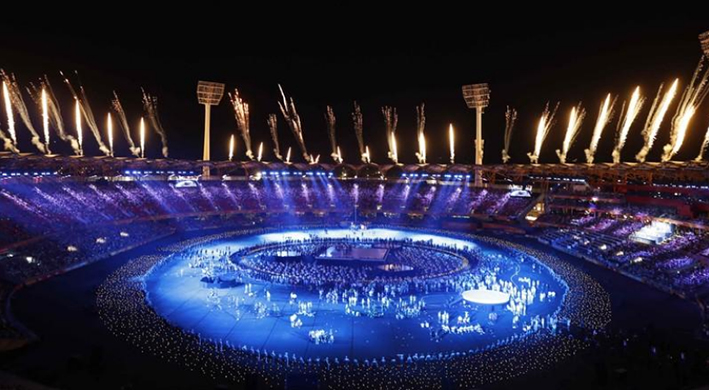GOLD COAST, Australia, (Reuters) – A diverse and contemporary ceremony of music, lights and dance with the words and imagery of indigenous Australia very much at its heart brought an end to the XXI Commonwealth Games on the Gold Coast yesterday.
Organisers signed off with the uncontroversial assertion that they had delivered the best possible environment for the athletes from 71 mostly former British colonies to showcase their skills over 11 sun-kissed days in the beachside city.
“You have delivered a truly Golden Games for the Commonwealth,” Common-wealth Games Federation (CGF) President Louise Martin said.
“A Games of innovation, inspiration, colour and vibrancy with an exuberant Gold Coast buzz – embracing us all with your warmth and friendship.”
For a CGF constantly fighting the perception that a multi-sport event which sprung from the British Empire is an anachronism, there was confidence that the movement was firmly on the path back to relevancy.
The Gold Coast Games were the first with an equal number of gold medals for men’s and women’s events, included 38 events in a fully integrated Paralympic programme and welcomed a high-profile transgender athlete.
“Inclusion is the Commonwealth Games’ future, it’s what makes us extraordinary,” said organising committee chairman Peter Beattie.
“From its beginnings … the Games were always designed to be more than just a sporting spectacle. They are a way for us to come together and share what we have in common.”
As far as the sporting spectacle was concerned, the host nation came out as the biggest winners with 80 of the 275 gold medals, well clear of England on 45 and India (26) with Canada and New Zealand (both 15) rounding out the top five.
The CGF were keen to emphasise a greater diversity of medal winners with 43 nations taking at least one and the British Virgin Islands, Dominica, Cook Islands, Vanuatu and Solomon Islands all winning their first.
Of the nine world records set, the majority were in Paralympic events with the most prestigious coming in the pool in women’s 4x100m freestyle relay.
It was, almost inevitably, set by the Australian team, who put behind them their disappointing 2017 world championships by winning 28 swimming gold medals and 73 overall, well ahead of England’s nine (24).
Several high profile athletes like England’s Adam Peaty and Australia’s Kyle Chalmers appeared to be down on performance, as is often the case at this stage in the Olympic cycle.
Taylor Ruck was arguably the swimmer of the meeting with eight medals in eight events, leading a resurgent Canadian swimming team along with backstroke world record holder Kylie Masse.
Jamaica disappointment
With the now retired Usain Bolt watching from the stands, Jamaica’s sprinters had a desperately disappointing time in the athletics, winning none of the six titles in the 100m, 200m and 4x100m relays.
Bolt’s heir apparent Yohan Blake stumbled in the individual 100m and had to settle for bronze, while double Olympic sprint champion Elaine Thompson went home with just a relay silver.
Akani Simbine led a South African 1-2 to win the men’s 100m in 10.03 seconds, while Jereem Richards was handed the 200m after England’s Zharnel Hughes was disqualified for hindering the Trinidadian as they raced across the line in 20.12 seconds.
Trinidad and Tobago also took the women’s 100m through Michelle-Lee Ahye (11.14), while 400m Olympic champion Shaunae Miller-Uibo showed her growing prowess in the half-lap sprint to win 200m gold.
South Africa’s Olympic champion Caster Semenya also highlighted her versatility with a commanding 800m-1,500m double at Carrara Stadium.
Kyron McMaster brought some well-needed joy to the British Virgin Islands by winning its first Commonwealth Games medal in the 400 metres hurdles just six months after Hurricane Irma devastated the tiny nation and killed his coach.
Australia also dominated the cycling by taking 14 of the 26 golds up for grabs in the velodrome, on the road and up the mountain with their men’s 4000m team pursuit team setting a world record in the final.
The hosts might have matched their record of 84 golds at the 2006 Melbourne Games but for a few upsets in the team events, two in dramatic fashion on the final day of competition.
England’s Helen Housby held her nerve to land a penalty on the siren and stun the heavily favoured Australians 52-51 in the netball.
A couple of hours later, Kelly Brazier made a lung-busting 60-metre dash six minutes into sudden-death extra time to upset Australia’s Olympic champion rugby sevens team and give New Zealand the inaugural women’s title.
Both events were played in front of passionate packed houses, reflecting a Games where empty seats were few and far between and crowds were noisy and partisan.
The Lord Mayor of Birmingham, Anne Underwood, accepted the movement’s flag ahead of their hosting of the next version of the Games in 2022 and their segment of the closing ceremony reflected the diversity of the industrial British city.
“While we can’t promise you the sun, sand and sea of the Gold Coast Commonwealth Games, we can offer you youth, energy, creativity and a love of sport,” she said.
The closing ceremony came under immediate fire, not least from the presenters on Australian broadcasting rights holders Channel Seven, for sidelining the athletes and spending too much time on long-winded speeches.
Gold Coast Mayor Tom Tate was among the dignitaries who might have cut his contribution shorter after his pithy opening line.
“Gold Coast – you were AWESOME,” he said.









